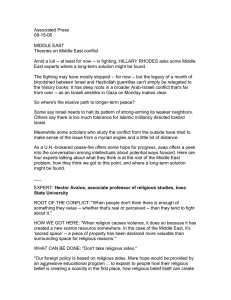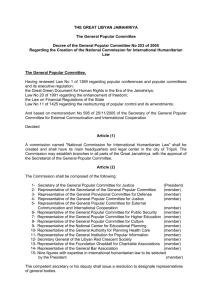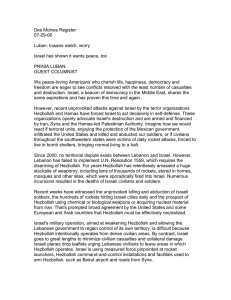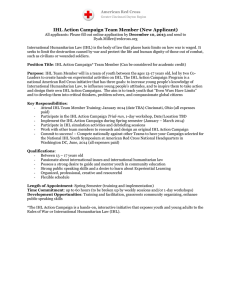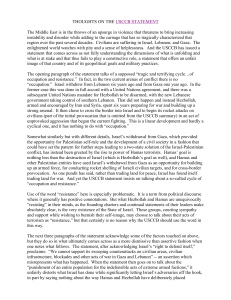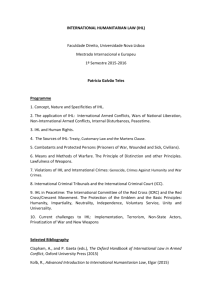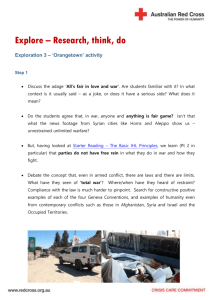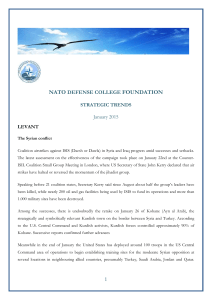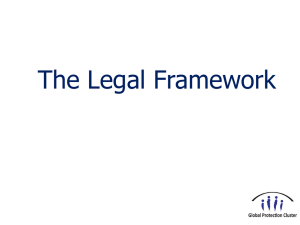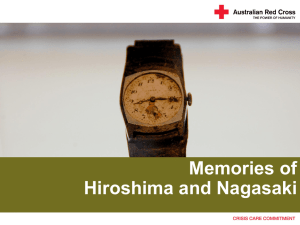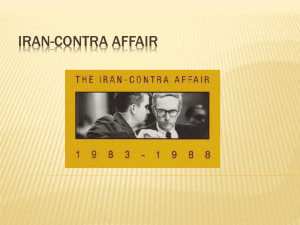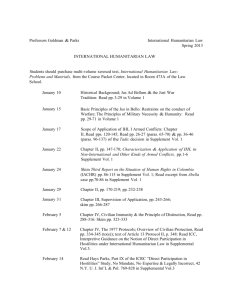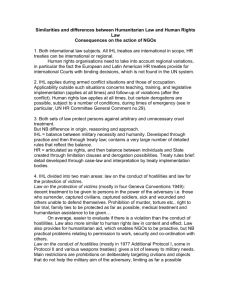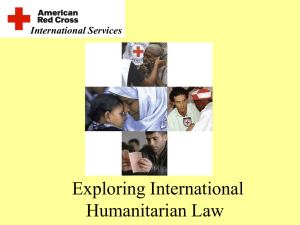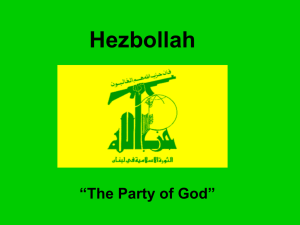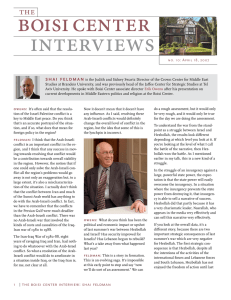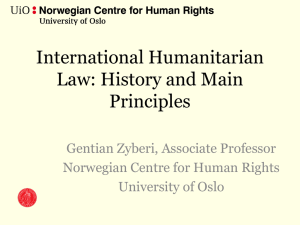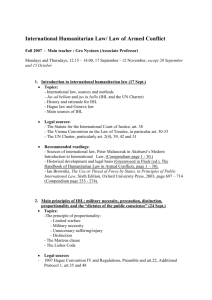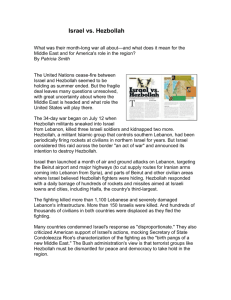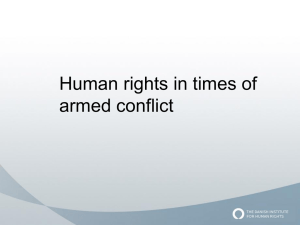Word - Anthony D`Amato - Northwestern University
advertisement
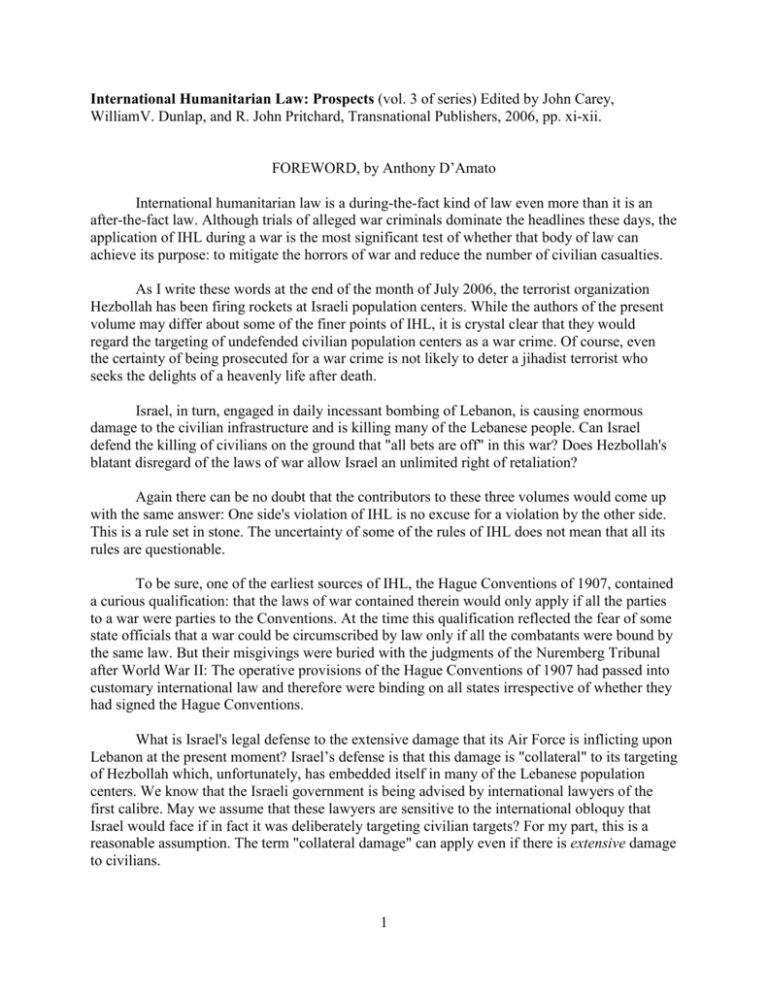
International Humanitarian Law: Prospects (vol. 3 of series) Edited by John Carey, WilliamV. Dunlap, and R. John Pritchard, Transnational Publishers, 2006, pp. xi-xii. FOREWORD, by Anthony D’Amato International humanitarian law is a during-the-fact kind of law even more than it is an after-the-fact law. Although trials of alleged war criminals dominate the headlines these days, the application of IHL during a war is the most significant test of whether that body of law can achieve its purpose: to mitigate the horrors of war and reduce the number of civilian casualties. As I write these words at the end of the month of July 2006, the terrorist organization Hezbollah has been firing rockets at Israeli population centers. While the authors of the present volume may differ about some of the finer points of IHL, it is crystal clear that they would regard the targeting of undefended civilian population centers as a war crime. Of course, even the certainty of being prosecuted for a war crime is not likely to deter a jihadist terrorist who seeks the delights of a heavenly life after death. Israel, in turn, engaged in daily incessant bombing of Lebanon, is causing enormous damage to the civilian infrastructure and is killing many of the Lebanese people. Can Israel defend the killing of civilians on the ground that "all bets are off" in this war? Does Hezbollah's blatant disregard of the laws of war allow Israel an unlimited right of retaliation? Again there can be no doubt that the contributors to these three volumes would come up with the same answer: One side's violation of IHL is no excuse for a violation by the other side. This is a rule set in stone. The uncertainty of some of the rules of IHL does not mean that all its rules are questionable. To be sure, one of the earliest sources of IHL, the Hague Conventions of 1907, contained a curious qualification: that the laws of war contained therein would only apply if all the parties to a war were parties to the Conventions. At the time this qualification reflected the fear of some state officials that a war could be circumscribed by law only if all the combatants were bound by the same law. But their misgivings were buried with the judgments of the Nuremberg Tribunal after World War II: The operative provisions of the Hague Conventions of 1907 had passed into customary international law and therefore were binding on all states irrespective of whether they had signed the Hague Conventions. What is Israel's legal defense to the extensive damage that its Air Force is inflicting upon Lebanon at the present moment? Israel’s defense is that this damage is "collateral" to its targeting of Hezbollah which, unfortunately, has embedded itself in many of the Lebanese population centers. We know that the Israeli government is being advised by international lawyers of the first calibre. May we assume that these lawyers are sensitive to the international obloquy that Israel would face if in fact it was deliberately targeting civilian targets? For my part, this is a reasonable assumption. The term "collateral damage" can apply even if there is extensive damage to civilians. 1 But that is not the end of the legal analysis. The extent of permissible collateral damage is bounded by the IHL doctrine of proportionality. For example, is it "proportional" to bomb a civilian apartment building because Hezbollah has rented an office there (an actual reported incident)? Is it "proportional" to destroy a suburban neighborhood because Hezbollah has hidden a rocket launcher between two buildings in that neighborhood? These are difficult questions. Professor Jordan Paust, writing in this volume, explores generally the extent of war--crimes liability for collateral damage. Terrorism by its nature tests the patience of military leaders. They desire no holds barred retaliation against terrorists irrespective of collateral damage. International humanitarian law pushes up against this impulse for unlimited retaliation. What is our destiny: law or anarchy? In the days ahead, no question can be more important for the civilized world than this question. It has been my distinct honor and privilege to have been invited to write a Foreword to each of these three well-conceived and brilliantly executed volumes on international humanitarian law. Anthony D’Amato Leighton Professor of Law Northwestern University, Chicago July 2006 2
